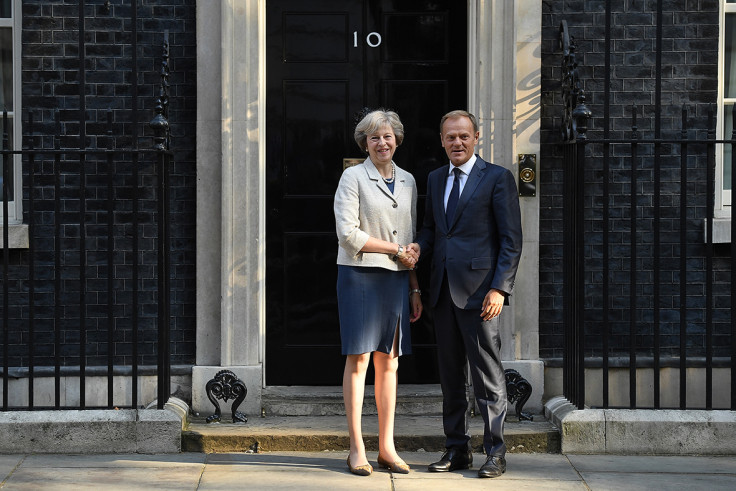Donald Tusk hits back at pro-Brexit MP in residency rights row
Conservative MP Michael Tomlinson demanded a guarantee over the rights of EU and UK citizens.

The President of the European Council Donald Tusk told British MPs that discussions over the status of reciprocal right of UK and EU citizens would be a subject for Brexit negotiations to be held after the country triggers Article 50 to formalise its intention to leave the union.
Tusk was replying to a letter from Conservative MP Michael Tomlinson demanding the European Council to guarantee reciprocal rights for EU and UK citizens, an appeal signed by a total of 52 MPs who backed leaving the European Union during the referendum campaign.
The letter also accused chief EU negotiator Michel Barnier of "obstructing member state negotiations on reciprocal rights," accusing him of being "worryingly indifferent" to the "anxiety and uncertainty" of citizens in each territory.
Tusk said the argument presented was "very interesting," but he found one major issue with it. "It has nothing to do with reality," Tusk wrote.
"Just like you, I would like to avoid a situation where citizens become 'bargaining chips' in the negotiation process. In order for this not to happen, we will need precise and comprehensive solutions, which, other than nice-sounding expressions, will provide citizens with genuine guarantees of security," he added.
The letter exchange follows reports that German Chancellor Angela Merkel blocked an early proposal from her British counterpart Theresa May to reassure EU citizens in the UK and Britons on the continent of their residency rights.
Tomlinson was not satisfied with reply, calling it "disappointing" and "wrong-headed".
. @eucopresident response to my letter is disappointing and wrong headed. He is putting EU process above and beyond human beings.
— Michael Tomlinson MP (@Michael4MDNP) November 29, 2016
Read Donald Tusk's reply to British MPs in full
Dear Mr Tomlinson
Dear UK Parliamentarians
I read your letter with great interest. Your concern for the status of EU citizens in the UK and UK citizens living and working in Europe bodes well for the future negotiations, especially since we have assumed that one of the main reasons for the vote for Brexit was the rejection of the free movement of people and all the rights it entails, as defined by the European treaties.
In your letter you state that the European Commission, and in particular Mr Barnier, are attempting to prevent negotiations, thereby creating 'anxiety and uncertainty for the UK and EU citizens living in one another's territories.' It is a very interesting argument, the only problem being that it has nothing to do with reality. Would you not agree that the only source of anxiety and uncertainty is rather the decision on Brexit? And that the only way to dispel the fears and doubts of all the citizens concerned is the quickest possible start of the negotiations based on Art. 50 of the Treaty?
Immediately after the referendum I declared, on behalf of the 27 EU Member States and the European institutions, that we were ready to launch the negotiation process as early as the following day. I still stand by that declaration.
In your letter you called on me 'to resolve this matter once and for all' at the European Council in December. This would in effect mean the start of the negotiations already in December. The EU stands ready to do so, but that can only happen on the condition that Art. 50 has been triggered. Let me reiterate, however, that the decision about triggering Art. 50 belongs only to the UK, which we fully respect.
Just like you, I would like to avoid a situation where citizens become 'bargaining chips' in the negotiation process. In order for this not to happen, we will need precise and comprehensive solutions, which, other than nice-sounding expressions, will provide citizens with genuine guarantees of security.
Finally, I want to reassure you that today, and for as long as the UK remains a member of the EU, the Treaties guarantee the rights of all EU citizens, including UK citizens, as regards their residence, work, social security and health. People are not only protected by the substantive EU law against discrimination, but also by the European Court of Justice if their rights are not respected. This obviously concerns not only those citizens who currently live in other Member States, but also those who decide to do so in the future.
© Copyright IBTimes 2025. All rights reserved.






















